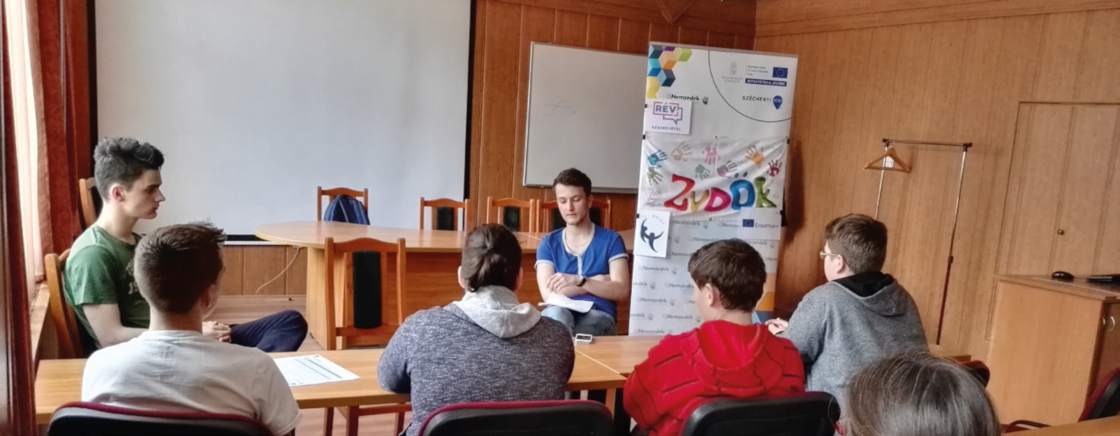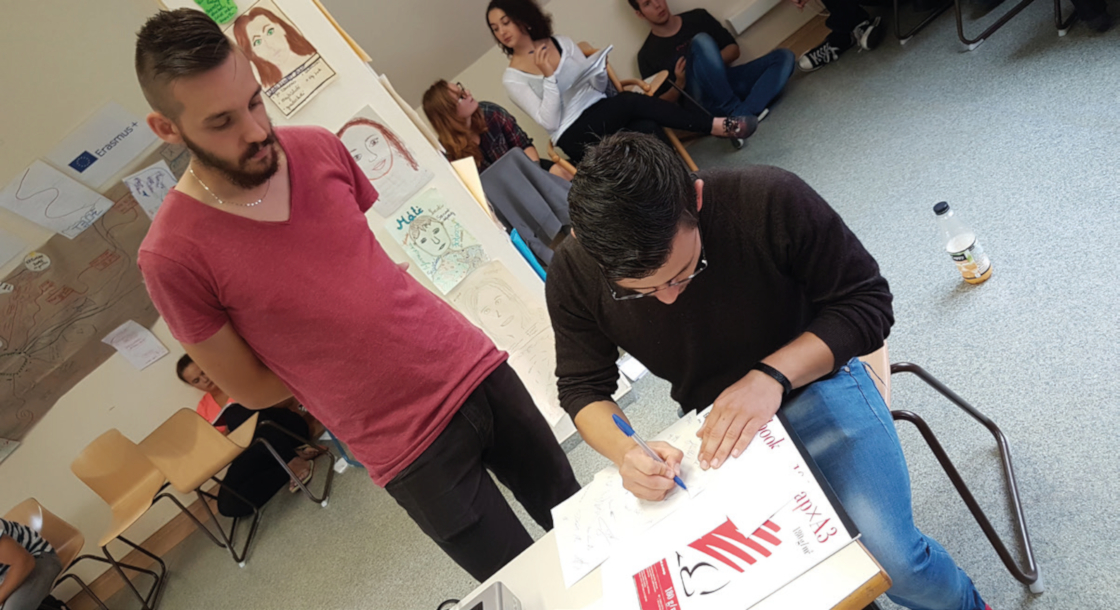
Experiential training course series, an active dialogue between youth and local government decision-makers, a gap-filling volume on youth work... These were all included in the structured dialogue project implemented by the Federation of Children’s and Youth Councils (FCYMC) with the involvement of nearly 40 municipalities and 455 participants. The young participants learnt about the aspects of sustainable municipal development, assessed the needs of their own communities and launched a dialogue with local government decision-makers. Coordinator Barnabás Gulyás told us about the challenges, achievements and beauties of the ambitious project.
Reparticipation – Young people think in terms of a community
Institution: Federation of Children's and Youth Municipal Councils (FCYMC)
Project title: RÉszreVétel (RÉV)
Coordinator: Barnabás Gulyás
Website: www.reszrevetel.hu
Video: https://www.youtube.com/watch?v=P94buL5zTy0&feature=youtu.be
Project values:
RÉV has improved the dialogue between the youth and the decision-makers nation-wide. Within local communities, actual processes were initiated which influenced the lives of young people, the decision-makers, as well as that of the community. Besides, they also published a gap-filling, practice-oriented volume, titled Locally How? Practical Starting Points for Municipal Youth Work, providing help to every local government youth specialist in their work.
RÉszreVétel (RÉV) is a very complex project. How would you briefly explain to an outsider what it's all about?
It was an initiative meant to raise attention. We pointed out that it was still worth believing that young people think in terms of a community. At the same time, our organisation could challenge itself in a safe situation during RÉV. We could develop the community without having to bear the entire responsibility, because we assumed the role of the catalyser. We gave communities the power, the "horses", but it was up to them to be able to make changes.
Did this role make your work easier?
In the long term, not necessarily. As a catalyser, you can't achieve such powerful and lasting changes locally as you could by assuming an active role in the municipal processes. It always has a greater impact when such matters are initiated from inside. During our meetings, we managed to motivate some of the young participants to assume this role of internal initiators, but the others we couldn't, unfortunately. It makes the internal changes harder when the needs of the community are not yet identified or if the members of the community constantly change.

The project was launched in 2016 and ended in 2017. Do you still keep in touch with the young participants?
Yes, we do. With some of them, we have a closer relationship, we are even considering common projects, and have also made joint efforts to implement them. The lives of some of them were greatly influenced by the project. One, for example, is a team leader in a long-term international youth exchange project.
In a number of municipalities they had tangible achievements. In Zalaegerszeg, for example, close cooperation began between the youth and the local government, and in Törökbálint, they established a youth club. Now you can also see the long-term effects of the project. What are your experiences in this respect?
The achievements of the project did not disappear, and new initiatives have also been launched. The project participants from Eger, for example, could also join another of our structured dialogue projects, where they gained even more experience and now they are applying with their own project. Moreover, from an administrative point of view, the applicant is the local government, and thus the decision-maker party also assumes an active role in the implementation of their winning project.
A book was also published (Locally How?), which was a great and unexpected success. Although the publication is not fully of a scientific nature, it provides gap-filling practical guidance for local governments where the youth specialist has no experience yet, or for ones which have no history of youth work yet. Due to the publication, we are also approached by one or two municipalities a month to give them advice.
What methods did you use during the youth training courses?
We tackled issues which were not necessarily attractive for them. Such issues were public policy, dialogue, local governance, all put into an entertaining framework. The exercise with the map, for example. We asked each young participant to draw the town or village where they'd come from without using any help, telephone or map. Thus, they practically drew their own mental maps, indicating the places which were important to them. When we compared these to the actual maps, they realised how little they had known about other opportunities or, as it happened, how big their home towns were. Later they also drew the maps of their home towns and villages as they would ideally look like - among realistic conditions. All in all, we used the well-established methods of non-formal learning, only tailored to our own project. We made not too "sexy" issues attractive, and that required our faith in the importance of experiential learning.

What did you learn during the project?
It was a very ambitious project, with lots of participants and relatively long processes. In retrospect, I think it was too ambitious. We submitted our application three times before it was approved by the national agency. Initially, we didn't assess our goals and set too many of them for ourselves. Finally, after a lot of consultations, the fourth version was approved, but there was still a chance that we wouldn't be able to achieve everything we’d planned. They let us experience it personally; otherwise, we wouldn't have been able to launch the professional processes which were developed after - and partly due to - RÉV.
What effects did the project have on your organisation?
The organisation has improved a lot, both in terms of quality and quantity. We got to know our target group and can respond to their needs better now. The young participants turn to us with a variety of matters, from Erasmus through career orientation to methodology issues. Due to our better relations with the local governments, our capacity has increased, and now we can work with more volunteers and get more assignments, too. This project has synthesised all our previous knowledge, which we have since further improved. I think there are only few organisations engaged in youth community development at such a level.
Personally, what was your best experience during the project?
The whole thing has a personal and a professional side. Due to the project, I met someone with whom I became close friends. From a professional point of view, the best thing was to see how an idea becomes reality. We also tried to begin with less ambitious ideas, but we couldn't let go of our dream to do something big this time. It was very exciting to see what processes were triggered within the communities. It gave us a lot, however hard it was to implement.
What are your plans for the future?
We will lay the emphasis on quality. During RÉV, we found that a considerable part of local governments couldn't specify what a youth function really covers. And that's an issue. We want to act against it. We want to improve the active dialogue between the youth and the decision-makers, and we are planning to prepare a number of professional materials for local governments. We can't give any money, but knowledge, we can.
Last modified: 08-08-2019















